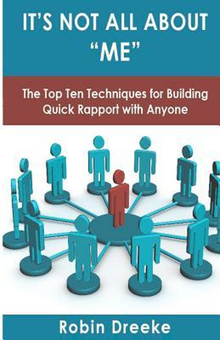Building Trust & Rapport With Robin Dreeke (FBI)
 (Originally posted at EnjoyMediation.com)
(Originally posted at EnjoyMediation.com)
Building rapport is one of the most important skills a mediator must be able to properly develop in order to be effective. It is one of the main aspects of my PhD research and many others before me have explored this within the context of mediation as well.
Robin Dreeke of the FBI wrote a fantastic book on building rapport and recently answered questions for the Farnam Street Blog. The Q&A's are listed below while further below are ten tips for building rapport. Links to read more on each are provided.
While reading it, take a moment to reflect on how you build rapport. Do you even consider it important? What do you do? What do you avoid doing?
From Farnam Street:
I had an opportunity to ask Robin Dreeke a few questions. Robin is in charge of the Federal Bureau of Investigation’s elite Counterintelligence Behavioral Analysis Program and the author of It’s Not All About Me.
Robin combines science and years of work in the field to offer practical tips to build rapport and establish trust. In this brief interview he discusses building relationships, how to approach someone you don’t know and ask for a favor, and the keys to establishing trust.
1) A lot of people are interested in strengthening and furthering relationships. How can people do this?
2)Trust is a foundation to most situations in life. How can we develop trust? What are the keys?
3) What’s the best way to approach someone you don’t know and ask them for a favor?
4) What are some strategies to build rapport while giving a talk, presentation, or interview?
5) I suspect you spend a lot of time trying to figure out if people are manipulating you or the situation? Can you talk about this? How can you tell when people are attempting to manipulate you?
6) If you had to give a crash course in building a relationship with someone, what are the top 5 things people need to do? What carries the bulk of the freight so-to-speak?
Read the answers to the questions [HERE].
Robin Dreeke's 10 Ways To Build Rapport from Farnam Street:
1) Establish Artificial Time Constraints
2) Accommodating Nonverbals
3) Slow Speech Rate
4) Sympathy or Assistance Theme
5) Ego Suspension
6) Validate Others
7) Ask… How? When? Why?
8) Connect With Quid Pro Quo
9) Gift Giving
10) Manage Expectations
Read more about each from Farnam Street [HERE].
Tags:
Replies to This Discussion
About
@ADRHub Tweets
© 2025 Created by ADRhub.com - Creighton NCR.
Powered by
![]()